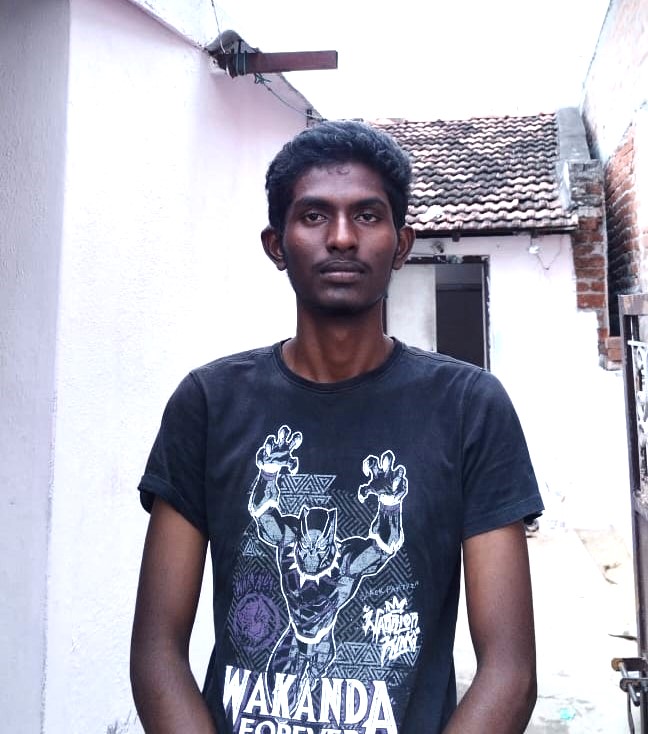Introduction
Charity, while inherently noble, can have unintended psychological effects on recipients. Understanding these impacts is crucial for providing meaningful and dignified support. This narrative delves into the story of Gokul R., a young man from Erode District, whose experiences highlight the importance of empathy and discretion in charitable acts.
Gokul’s Challenges

Gokul R. has faced significant challenges throughout his young life. His mother passed away a few months ago after enduring years of health issues. His father, employed as a security guard, struggles to support the family. Despite these hardships and also being the first graduate in his family, Gokul enrolled in his first year of college, pursuing a B.Sc. in Electronics. To fund his education, he works at a logistics company from 7 PM to 7 AM, then attends college in the morning, catching brief moments of rest between loading and unloading consignments. This demanding schedule leaves him with little comfort or respite.
Unveiling the Psychological Impact
As the Managing Trustee at TRICEF, I was initially heartened to hear that Gokul had received some assistance from his neighbors for his studies and basic needs. However, a personal conversation between Gokul and a TRICEF team member revealed a deeper, more troubling issue. Despite his potential, Gokul’s vision for his future was limited to opening an electronics shop in his hometown. When our team encouraged him to consider further studies and better job opportunities, it became evident that his reluctance stemmed from deep-seated feelings of inferiority and obligation.
The root of this psychological barrier lay in the manner of the charity he received. Whenever neighbors offered help, it was publicized throughout the village, often during church congregations. This public display of charity unknowingly made Gokul feel indebted to everyone, leading him to believe that he had to heed their advice to show gratitude. Consequently, he began to limit his aspirations based on the limited perspectives of the village elders, despite his capabilities.
TRICEF’s Approach to Dignified Support
Recognizing this, our village coordinator, Mrs. Chitra, and her husband requested the congregation head to stop such public displays of charity. They suggested that any assistance should be offered privately, respecting the recipient’s dignity and self-respect. This change aims to ensure that individuals like Gokul can receive help without feeling psychologically burdened or obligated.
At TRICEF, we have counseled Gokul, providing him with exposure to new learning opportunities and helping to remove his mental block of staying confined to his hometown. We emphasized the importance of thinking beyond the immediate suggestions of those offering help, encouraging him to dream bigger and pursue greater achievements. This counseling is a continual process, aiming to empower Gokul to see beyond his current circumstances.
Empowering Gokul and the Role of Donors
While this post goes public, Gokul will not feel like a debtor. Instead, he will be grateful to the donors for a lifetime, feeling the genuine support that uplifts rather than obligates him. This approach not only benefits Gokul but also provides donors with the satisfaction of helping an individual achieve his career aspirations, fostering a sense of meaningful contribution and connection.
Conclusion
Gokul’s story is a powerful reminder of the complex psychological impacts that well-intentioned charity can have on recipients. It underscores the importance of offering support in a way that preserves the dignity and self-worth of those in need. By providing assistance discreetly and respectfully, we can help individuals like Gokul realize their full potential without feeling embarrassed or obligated. At TRICEF, we remain committed to this approach, ensuring that our efforts truly empower and uplift the communities we serve.
Support Gokul’s Journey
Help Gokul overcome his challenges and achieve his dreams by donating to his educational fund. Your contribution can make a significant impact on his life.
Join Our Volunteer Team
Interested in making a difference through education and sustainability? Join our volunteer team at TRICEF! Whether you’re passionate about teaching, community outreach, or project management, we welcome your skills and enthusiasm. Together, we can create lasting change in underprivileged communities.
Join Our Volunteer Team – Click here to learn more and sign up to become a TRICEF volunteer today!
References
The Psychological Impact of Receiving Charity: ResearchGate – The Psychological Impact of Receiving Charity
Case Studies on Effective Charitable Interventions: World Bank – Successful Case Studies
National Scholarship Portal: National Scholarship Portal